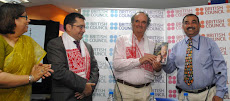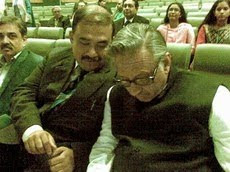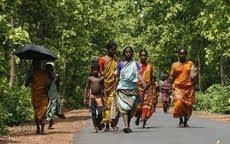 By Subir Bhaumik
By Subir Bhaumik  trial of the "war criminals" of 1971. The Jamiat-e-Islami opposed the resolution and walked out of the parliament. The BNP did not oppose the bill directly but stayed away from the voting on another small pretext - they were unhappy with the sitting arrangements in the parliament. Most Jamiat leaders supported the Pakistan army in the Bangladesh liberation war in 1971. They joined the Pakistani troops in massacres of pro-liberation Bengali men and women, they dragged hundreds of their own women and allowed the Pakistani soldiers to rape them, they killed hundreds of Bengali intellectuals - writers, dramatists, poets, teachers - because they saw these people as the force behind the surge of Bengali linguistic nationalism that was breaking up Pakistan. They formed the Razakar and Al-Badr and Al-Shams Bahini to fight the Mukti Bahini. They raped, killed, tortured millions to protect Islam.
trial of the "war criminals" of 1971. The Jamiat-e-Islami opposed the resolution and walked out of the parliament. The BNP did not oppose the bill directly but stayed away from the voting on another small pretext - they were unhappy with the sitting arrangements in the parliament. Most Jamiat leaders supported the Pakistan army in the Bangladesh liberation war in 1971. They joined the Pakistani troops in massacres of pro-liberation Bengali men and women, they dragged hundreds of their own women and allowed the Pakistani soldiers to rape them, they killed hundreds of Bengali intellectuals - writers, dramatists, poets, teachers - because they saw these people as the force behind the surge of Bengali linguistic nationalism that was breaking up Pakistan. They formed the Razakar and Al-Badr and Al-Shams Bahini to fight the Mukti Bahini. They raped, killed, tortured millions to protect Islam. Immediately after independence, Bangabandhu Sheikh Mujib enacted a new law - War Crimes Tribunals Act, 1973 - to try these war criminals - the people responsible for the death of 25 lakh Bangladeshis and the rape of 5 lakh Bengali women, Muslims and Hindus alike. But as the freedom fighters (Muktijoddhas) started killing these "war crminals" by taking law into their own hands, Mujib abandoned his plans for war crimes trials and announced a general amnesty (sadharan khoma ghoshona) for these war criminals. As head of a newly born nation, it was his priority to maintain public order. But these war criminals continued their conspiracies against Bangladesh. Jamiat chief Gholam Azam even started a movement for re-integration (punormilon) of Pakistan and Bangladesh to "save Islam."
Immediately after independence, Bangabandhu Sheikh Mujib enacted a new law - War Crimes Tribunals Act, 1973 - to try these war criminals - the people responsible for the death of 25 lakh Bangladeshis and the rape of 5 lakh Bengali women, Muslims and Hindus alike. But as the freedom fighters (Muktijoddhas) started killing these "war crminals" by taking law into their own hands, Mujib abandoned his plans for war crimes trials and announced a general amnesty (sadharan khoma ghoshona) for these war criminals. As head of a newly born nation, it was his priority to maintain public order. But these war criminals continued their conspiracies against Bangladesh. Jamiat chief Gholam Azam even started a movement for re-integration (punormilon) of Pakistan and Bangladesh to "save Islam."  Finally when Mujib was killed in a military coup, the generals politically rehabilitated these "war criminals" and used them against the forces of secular democracy in Bangladesh, against the Awami League and its leftist allies, against the politics of tolerance and liberalism.
Finally when Mujib was killed in a military coup, the generals politically rehabilitated these "war criminals" and used them against the forces of secular democracy in Bangladesh, against the Awami League and its leftist allies, against the politics of tolerance and liberalism. In 1992, after the end of military rule , the secular intellgensia of Bangladesh got together to form the "1971-er Ghatak oo Dalal Nirmul Committee." Led by the late Jahanara Imam , the mother of three dead freedom fighters (Muktijoddhas), the movement gathered huge momentum. The Awami League gained from this momentum and came to power in 1996. Even after the Awami League's defeat in 2001, this movement, now led by the courageous writer and film maker Shahriar Kabir , against raised the demand for the war crimes trial . Researchers on Bangladesh's freedom struggle, like M A Hassan, have done huge documentation on the war crimes - the details have found place in his huge book.
 The Sectors Commanders Forum joined the Nirmul Committee in its campaign against the war criminals, the fundamentalist forces. This Forum represents the freedom fighters of 1971 and their commanders at that time - most of these commanders later served in the Bangladesh army and remained loyal to the secular democratic ideals of 1971, even when some Bangladeshi generals took the Pakistani path.
The Sectors Commanders Forum joined the Nirmul Committee in its campaign against the war criminals, the fundamentalist forces. This Forum represents the freedom fighters of 1971 and their commanders at that time - most of these commanders later served in the Bangladesh army and remained loyal to the secular democratic ideals of 1971, even when some Bangladeshi generals took the Pakistani path. Just before the December 2008 elections, the Awami League adopted the war crimes trial demand in their manifesto, under huge pressure from the secular groups like the Nirmul Committee and the Sectors Commanders Forum and the Writers Forum. Now it has passed a resolution.
Some, like Hassan, want the war crimes trial under United Nations - like the Bosnia or the Rwanda war crimes trial. They say that give the trial the credibility and allow the UN to drag Pakistani military officials responsible for the war crimes to the international court. UN special envoy Ian Martin has offered Sheikh Hasina all help in this matter. But others like Nirmul Committee leader Shahriar Kabir want the trial to be started under the Bangladeshi law - war Crinmes Tribunal Act, 1973. He told me in a BBC interview recently in Kolkata that UN trial may take a long time to start and that delay would be costly. He said in view of the huge mandate secured by the Awami League , this was the best time to start the war crimes trial with the nation's sentiment firmly against the Islamic fundamentalists. Kabir says it is more important to destroy the Jamiat and other Islamic fundanmentalist groups - and the war crimes trial should be the start of a massive political offensive against these forces that will turn the tide in the battle against Islamic terror in South Asia.
 Many agree with Kabir, other think Hassan has a point. The credibility of the trials will be more if done under UN aegis. But it may also cause delays and many criminals may get away using legal loopholes. But on one point, there is near - complete agreement - that the war criminals of 1971 should be tried and punished. Surely the Bangladeshi war criminals, even if it is not possible to bring the Pakistanis to justice under Bangladesh law. Bangladesh is not a fundamentalist country like Pakistan - it was created on the basis of Bengali secular linguistic nationalism and any fair election will ensure the victory of the secular demnocratic forces. If the war crimes trials progress, the Islamic extremists will be on a clear defensive. That's good for Bangladesh but it is also good for India, specially states like Assam and West Bengal, where Islamic radicalism , both overground and underground, was growing , encouraged by developments across the border.
Many agree with Kabir, other think Hassan has a point. The credibility of the trials will be more if done under UN aegis. But it may also cause delays and many criminals may get away using legal loopholes. But on one point, there is near - complete agreement - that the war criminals of 1971 should be tried and punished. Surely the Bangladeshi war criminals, even if it is not possible to bring the Pakistanis to justice under Bangladesh law. Bangladesh is not a fundamentalist country like Pakistan - it was created on the basis of Bengali secular linguistic nationalism and any fair election will ensure the victory of the secular demnocratic forces. If the war crimes trials progress, the Islamic extremists will be on a clear defensive. That's good for Bangladesh but it is also good for India, specially states like Assam and West Bengal, where Islamic radicalism , both overground and underground, was growing , encouraged by developments across the border. Post your Feedback on this column at : feedback@bengalnewz.com OR feedback2bn@gmail.com






